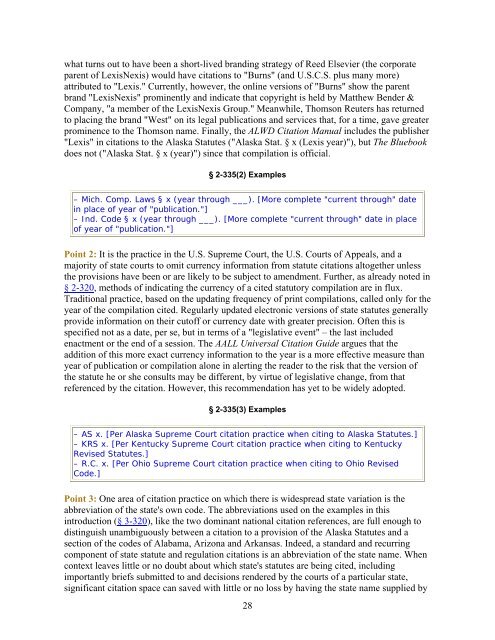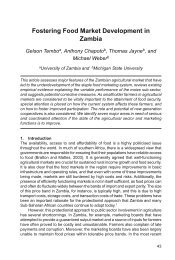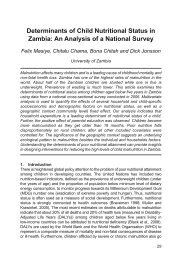Introduction to Basic Legal Citation - access-to-law home
Introduction to Basic Legal Citation - access-to-law home
Introduction to Basic Legal Citation - access-to-law home
You also want an ePaper? Increase the reach of your titles
YUMPU automatically turns print PDFs into web optimized ePapers that Google loves.
what turns out <strong>to</strong> have been a short-lived branding strategy of Reed Elsevier (the corporate<br />
parent of LexisNexis) would have citations <strong>to</strong> "Burns" (and U.S.C.S. plus many more)<br />
attributed <strong>to</strong> "Lexis." Currently, however, the online versions of "Burns" show the parent<br />
brand "LexisNexis" prominently and indicate that copyright is held by Matthew Bender &<br />
Company, "a member of the LexisNexis Group." Meanwhile, Thomson Reuters has returned<br />
<strong>to</strong> placing the brand "West" on its legal publications and services that, for a time, gave greater<br />
prominence <strong>to</strong> the Thomson name. Finally, the ALWD <strong>Citation</strong> Manual includes the publisher<br />
"Lexis" in citations <strong>to</strong> the Alaska Statutes ("Alaska Stat. § x (Lexis year)"), but The Bluebook<br />
does not ("Alaska Stat. § x (year)") since that compilation is official.<br />
§ 2-335(2) Examples<br />
– Mich. Comp. Laws § x (year through ___). [More complete "current through" date<br />
in place of year of "publication."]<br />
– Ind. Code § x (year through ___). [More complete "current through" date in place<br />
of year of "publication."]<br />
Point 2: It is the practice in the U.S. Supreme Court, the U.S. Courts of Appeals, and a<br />
majority of state courts <strong>to</strong> omit currency information from statute citations al<strong>to</strong>gether unless<br />
the provisions have been or are likely <strong>to</strong> be subject <strong>to</strong> amendment. Further, as already noted in<br />
§ 2-320, methods of indicating the currency of a cited statu<strong>to</strong>ry compilation are in flux.<br />
Traditional practice, based on the updating frequency of print compilations, called only for the<br />
year of the compilation cited. Regularly updated electronic versions of state statutes generally<br />
provide information on their cu<strong>to</strong>ff or currency date with greater precision. Often this is<br />
specified not as a date, per se, but in terms of a "legislative event" – the last included<br />
enactment or the end of a session. The AALL Universal <strong>Citation</strong> Guide argues that the<br />
addition of this more exact currency information <strong>to</strong> the year is a more effective measure than<br />
year of publication or compilation alone in alerting the reader <strong>to</strong> the risk that the version of<br />
the statute he or she consults may be different, by virtue of legislative change, from that<br />
referenced by the citation. However, this recommendation has yet <strong>to</strong> be widely adopted.<br />
§ 2-335(3) Examples<br />
– AS x. [Per Alaska Supreme Court citation practice when citing <strong>to</strong> Alaska Statutes.]<br />
– KRS x. [Per Kentucky Supreme Court citation practice when citing <strong>to</strong> Kentucky<br />
Revised Statutes.]<br />
– R.C. x. [Per Ohio Supreme Court citation practice when citing <strong>to</strong> Ohio Revised<br />
Code.]<br />
Point 3: One area of citation practice on which there is widespread state variation is the<br />
abbreviation of the state's own code. The abbreviations used on the examples in this<br />
introduction (§ 3-320), like the two dominant national citation references, are full enough <strong>to</strong><br />
distinguish unambiguously between a citation <strong>to</strong> a provision of the Alaska Statutes and a<br />
section of the codes of Alabama, Arizona and Arkansas. Indeed, a standard and recurring<br />
component of state statute and regulation citations is an abbreviation of the state name. When<br />
context leaves little or no doubt about which state's statutes are being cited, including<br />
importantly briefs submitted <strong>to</strong> and decisions rendered by the courts of a particular state,<br />
significant citation space can saved with little or no loss by having the state name supplied by<br />
28




